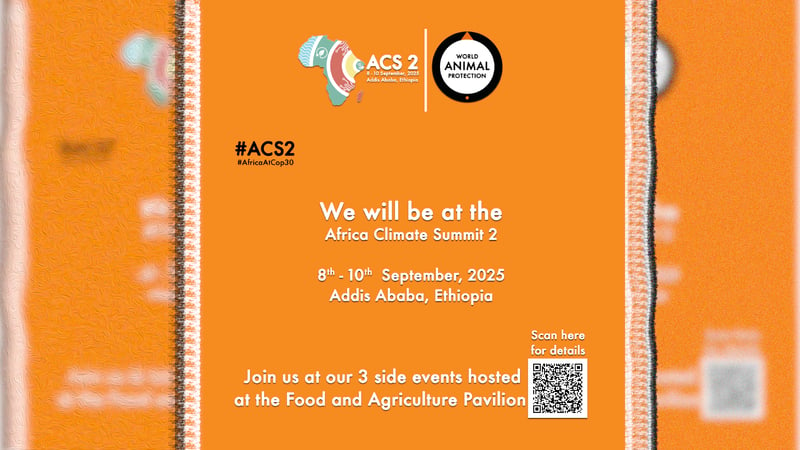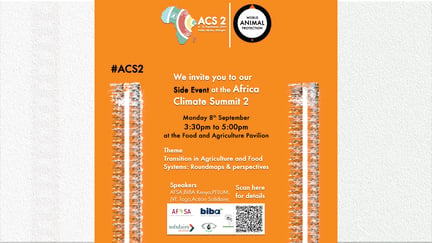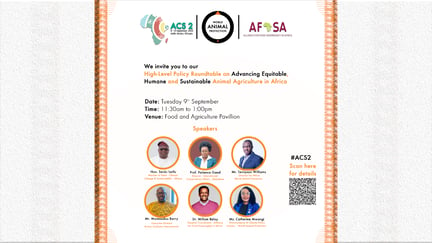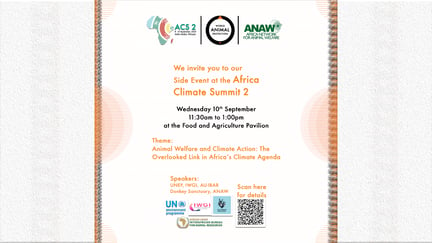
World Animal Protection at the Africa Climate Summit 2025
News
The Africa Climate Summit 2025 in Addis Ababa is a landmark event for the continent. Leaders, scientists and civil society will gather to discuss how Africa can adapt to a changing climate, finance green growth and advocate for justice in global negotiations.
This year, one subject is gaining overdue attention: the way we produce food and care for animals. Agriculture sustains millions but also contributes to deforestation and emissions. For a deeper look at how industrial animal farming drives greenhouse gases and what policymakers can do about it, see our briefing paper Towards equitable, humane and sustainable food systems. World Animal Protection will be present to ensure that humane and sustainable food systems are part of the conversation.
Understanding the Africa Climate Summit
Why the Summit Matters
The Africa Climate Summit is designed to amplify African perspectives on climate action. Delegates will discuss renewable energy, water resilience and climate finance. The summit emphasises self determination, urging African nations to lead the way rather than follow one size fits all models. By prioritising food systems, the summit recognises that hunger, biodiversity and climate stability are linked. For many African countries, reforming agriculture is essential for resilience.
World Animal Protection at the Summit
Humane and Sustainable Food Systems
World Animal Protection advocacates for equitable, humane, and sustainable food systems. At the summit, we will highlight how humane farming and agroecology offer solutions for both people and the planet. By moving away from industrial animal agriculture and towards systems that protect animals and the environment, emissions can be reduced, antibiotic use can be minimised and local economies can thrive. We insist that caring for animals is not a luxury but a pathway to climate resilience and food sovereignty. For these reason we will be hosting 3 side events at the Agriculture & Food Systems Pavilion.
Highlighting our Side Events
A Just Transition Must Tackle Agriculture and Food Systems
News
Just transition in Africa means transforming agriculture. This summit event explores humane farming, plant rich diets and policies for sustainable food systems.
High Level Policy Roundtable on Advancing Equitable, Humane & Sustainable Agriculture
News
Advancing humane and sustainable animal agriculture at Africa Climate Summit 2025: policies, indigenous breeds and food sovereignty take centre stage
Animal Welfare and Climate Action: The Overlooked Link
News
Highlighting the overlooked link between humane animal care and climate action, this Africa Climate Summit session promotes nature positive farming and plant rich diets.
Conclusion
The Africa Climate Summit 2025 offers a crucial opportunity to reimagine African food systems. By centring animal welfare and agroecology, World Animal Protection is showing that compassionate practices can strengthen resilience, reduce emissions and support local economies. As leaders and citizens seek a sustainable future, integrating humane farming into climate strategies will help build a world where animals, people and the environment flourish together.
Take Action: Be Part of the Solution
It's time to take a stand for a better food system. Advocate for policies that prioritize animal welfare, and promote sustainability. Say no to industrial animal agriculture, reject food systems built on cruelty and environmental destruction. Your voice matters in creating a future where food is ethical, humane, and sustainable.
Frequently Asked Questions
How does animal welfare affect climate change?
When animals are kept in cramped conditions and fed imported grains, they produce more methane and require land that drives deforestation. Humane practices, where animals graze and are part of diverse farms, cut emissions and improve soil health.
What is agroecology and why is it important?
Agroecology is a way of farming that respects ecological principles. It relies on crop diversity, natural pest control and welfare friendly livestock. It matters because it can yield robust harvests while reducing pollution and conserving biodiversity.
Why is World Animal Protection involved in climate talks?
The organisation sees animal welfare as inseparable from environmental health. By advocating at the summit, it ensures that policymakers consider humane food systems as part of climate solutions.
What can individuals do to support humane food systems?
People can choose plant rich meals, support local farmers who practise humane animal husbandry and advocate for policies that fund agroecological projects. Public demand influences markets and government priorities.
How will these side events influence policy?
By bringing together ministers, researchers and communities, the side events create momentum for integrating animal welfare into national strategies. Ideas shared at the summit can translate into reforms, investments and collaborations that extend beyond the event.


